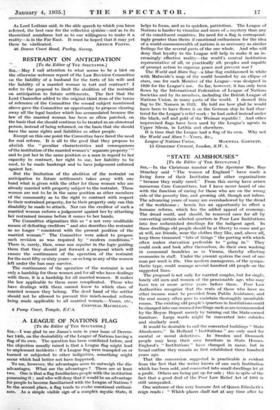RESTRAINT ON ANTICIPATION [To the Editor of THE SPECTATOR.] SIR,
May I call attention to what seems to be a blot on the otherwise welcome report of the Law Revision Committee on the liability of a husband for the torts of his wife and the liability of a married woman in tort and contract? I refer to the proposal to limit the abolition of the restraint on anticipation to future settlements. The fact that the Lord Chancellor added to the original third item of the terms of reference of the Committee the second subject mentioned above gave the Committee an opportunity to propose clearing away all the legal lumber which has accumulated because the law of the married woman has been so often patched, on the basis that she should continue to be treated as an abnormal person, instead of being reformed, on the basis that she should have the same rights and liabilities as other people.
Except on this one point the Committee have faced the need for real reform. It is all to the good that they propose to abolish the " peculiar characteristics and consequences of the institution of the married woman's ' separate property " and to put her in the same position as a man in regard to her capacity to contract, her right to sue, her liability to be sued, to be made bankrupt and to have judgement enforced against her.
But the limitation of the abolition of the restraint on anticipation to future settlements takes away with one hand what is given .with the other for those women who are already married with property subject to the restraint. These women are not to be in the same position as other members of the community as to the right to contract with respect to their restrained property, for to their property only can this disability be made to attach. Nor can the creditor of such a married woman enforce a judgement against her by attaching her restrained income before it comes to her hands.
The COmmittee stigmatizes this as " a not very creditable means of defeating creditors " and also describes the restraint as no longer " consistent with the present position of the married woman." The Committee were asked to propose such revision as was required by " modern conditions." There is, surely, then, some non Sequitur in the logic guiding them that they should put forward a proposal which will ensure the continuance of the operation of the restraint for the next fifty or sixty years—or so long as any of the women left under the ban may survive.
The continuance of the operation of the restraint is not only a hardship for these women and for all who have dealings with them, it is a hardship for all married women. It makes the law applicable to them more complicated. Those who have dealings with them cannot know to which class of married women they belong. The dead hand of the settlor should not be allowed to prevent this much-needed reform being made applicable to all married women.—Yours, etc., 4 Pump Court, Temple, E.C.4.
CHRYSTAL MACMILLAN.






































 Previous page
Previous page